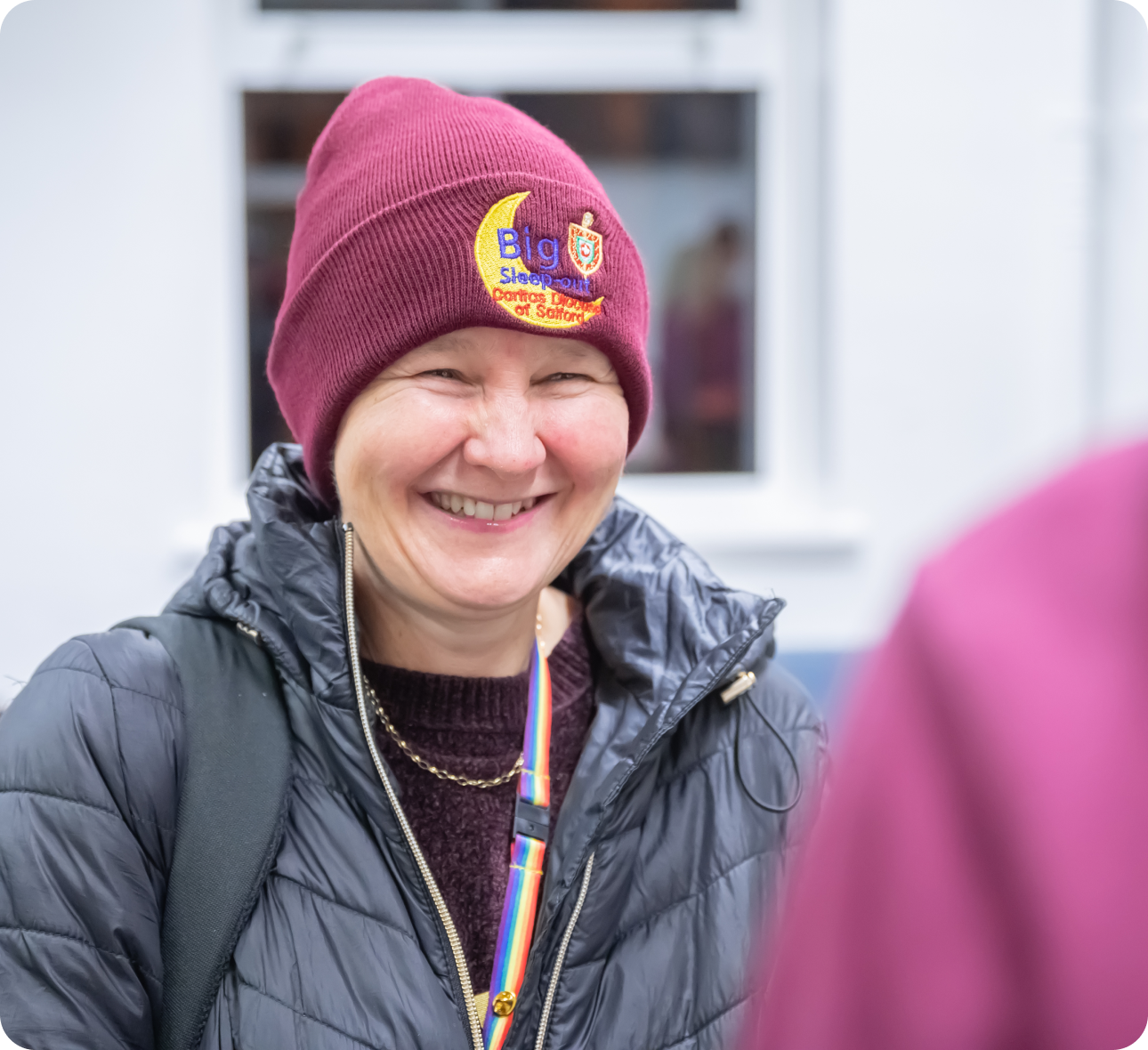How we’re focussed on ending homelessness

10 October 2023 is World Homeless Day.
At Caritas, we support many people who are experiencing homelessness or are at risk of becoming homeless. Here, Amanda, who leads our homelessness services, tells us more …
How long have you worked at Caritas and how long have you been involved in the homelessness sector?
I have worked for Caritas for nearly two years now but have been working in the homelessness sector for more than 30 years. I started as a volunteer doing soup runs while I was a student at Manchester University and it just developed from there.
Why is a day like World Homeless Day so important?
It’s important to have a day when we can draw attention to the fact that so many people in our communities don’t have a place to call home. This is a basic human right and we have a responsibility to try and do everything we can to ensure that everyone has a safe place to live.
What do you think people don’t realise about homelessness? Are there any myths you’d like to dispel?
People often associate homelessness with rough sleeping. There are too many people who are forced to sleep rough but this is just the tip of the iceberg. There are many more people who are living in unsupported bed and breakfasts or other temporary accommodation, or who are sofa surfing with friends and family or living in unsafe or unsuitable accommodation. These people are invisible and often get forgotten when there are discussions about homelessness.
Why do people become homeless?
There are as many different reasons for people becoming homeless as there are people who find themselves in this awful situation. Everyone’s experiences are unique to them.
However, in broad terms, the most common reasons are relationship breakdowns and the end of assured short hold tenancies, which is where a private landlord serves their tenant notice, even if they haven’t done anything wrong.
Most people imagine that if these things happened to them, they would have friends and family who would help but with the cost-of-living crisis affecting everyone, sometimes people can’t help, even if they would like to. What homeless people often say to me is that they never thought it could happen to them, but it has, and they have found it very traumatic, and this is when people turn to Caritas for support.
What does Caritas do to support people experiencing homelessness?
Caritas has a range of services to support people who are homeless including our open door day centres at Cornerstone in Hulme, Manchester and Red Door in Bury.
These services welcome anyone who is homeless or at risk of homelessness and see over 150 people each week. We provide a warm, safe space, free meals, showers, laundry for those sleeping rough, clothing and support. The support includes specialist advice agencies that visit each centre every week, a volunteering programme which gives people work experience and an activities programme that helps people to build skills, confidence and improves their physical and mental health.
We also have accommodation projects that support single homeless men (at our Morning Star supported accommodation project in Hulme, Manchester) and for young families too. These projects provide high quality supported accommodation and help people to resettle and make new homes in the community.
What does Caritas campaign for when it comes to homelessness? What do you want to change?
If we are going to end homelessness then things need to change at a structural level and so we work with local and national government to improve homelessness strategies, policies and procedures. We believe that the most important changes that need to happen are to:
- Spend more money on preventing homelessness, which in the long run is cheaper than having to accommodate people who become homeless and much less traumatic and damaging for individuals and families
- End rough sleeping by providing accommodation and support for anyone who finds themselves sleeping rough
- End the use of unsupported bed and breakfast accommodation and instead provide supported emergency accommodation for those that need it
- Change the governance of the private rented sector, to make it more affordable and more secure for people by, for example, ending the use of no fault evictions and increasing the Local Housing Allowance rates
- Increase the supply of truly affordable housing.
Is there anything that you’ve achieved since you joined Caritas that you’re particularly proud of?
Over the last two years we have restructured all our services and we’ve done this with the people in our services who have experience of homelessness and know what they need. We now have a really strong supported volunteering programme and we are running our services with people rather than thinking we have all the answers.
How can people locally help our work?
The public can help by:
- reporting to Streetlink if they see someone sleeping rough and are worried about them
- Raising the issue of homelessness with local and national politicians
- Giving a donation to help our work – by sponsoring a room, or an activity or making a general donation you will be helping to end homelessness in our communities.
